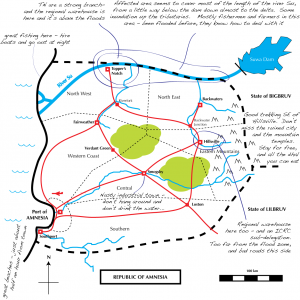 The training for IFRC’s Early Recovery Surge Team (FERST) seeks to prepare participants for deployment into an emergency setting, as part of a team of ER specialists undertaking detailed assessment, context analysis and programme design. The training event adopts three broad strategies across two phases.
The training for IFRC’s Early Recovery Surge Team (FERST) seeks to prepare participants for deployment into an emergency setting, as part of a team of ER specialists undertaking detailed assessment, context analysis and programme design. The training event adopts three broad strategies across two phases.
 In the first phase of the training participants are exposed to a strand of structured and moderated technical content, delivered by technical specialists, which is interlinked with a developing scenario which provides the opportunity to explore concepts and practice tools. At the end of the first phase participants are familiar with concepts and tools, and are working effectively in teams – albeit in a simulated environment called “Amnesia”.
In the first phase of the training participants are exposed to a strand of structured and moderated technical content, delivered by technical specialists, which is interlinked with a developing scenario which provides the opportunity to explore concepts and practice tools. At the end of the first phase participants are familiar with concepts and tools, and are working effectively in teams – albeit in a simulated environment called “Amnesia”.
In the second phase, these skills are taken to the field and re-tested in a real environment – and this is where the real learning often takes place.
Participants rotate leadership roles, and performance is closely observed and evaluated against a shared set of competencies. Participants are expected to create a complete and well-justified project as a final output, and are provided feedback on their performance.
Innovative aspects of this training event include the deliberate linkages between content and field practice with community participation, the dialogue feedback sessions after group work, and the participatory evaluation tools against transparent learning objectives.
After this initial event, two further iterations took place in 2009 in Uganda and 2011 in Malaysia.
Those with access to IFRC’s DMIS intranet can access some of the training materials and reports here: